
Research Publications
Explore our collection of research articles delving into critical topics affecting Muslim women. Our studies, authored by Syeda Samia Wali, PhD Scholar at Lincoln University College, Malaysia, offer in-depth analyses and insights into contemporary challenges and strengths within Muslim communities.
Research Article
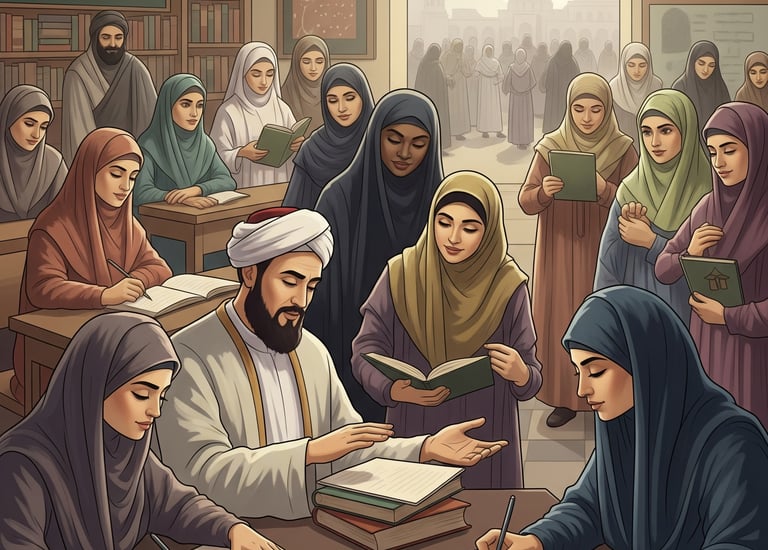

THE REVIVAL OF WOMEN’S STATUS IN ISLAM:
BEYOND CULTURAL DISTORTIONS
The status of women in Islam has long been subject to misinterpretation, often distorted by cultural traditions and patriarchal norms rather than Islamic teachings themselves. This paper explores the original rights and dignified status Islam granted women—such as the right to education, inheritance, ownership, consent in marriage, and participation in public life—contrasting these with the restrictive practices that emerged later due to socio-cultural influences. Through a historical and textual analysis of the Qur’an and Hadith, the study reveals a consistent emphasis on justice, equality, and human dignity. The paper also examines the ways in which Islamic reformers and scholars are reclaiming women's roles in society by returning to authentic sources. It argues that the revival of women’s status in Islam is not a modern invention but a restoration of foundational principles, offering a more inclusive and empowering understanding of Islamic gender ethics.
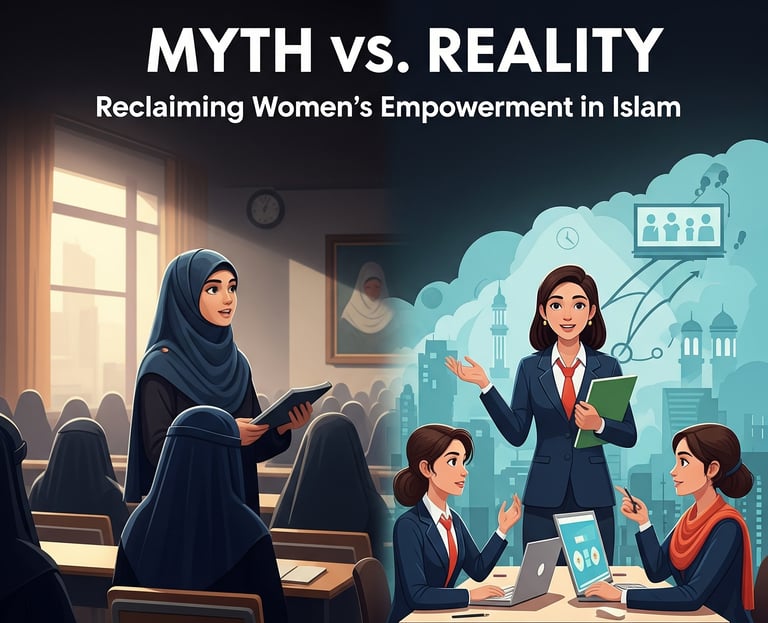

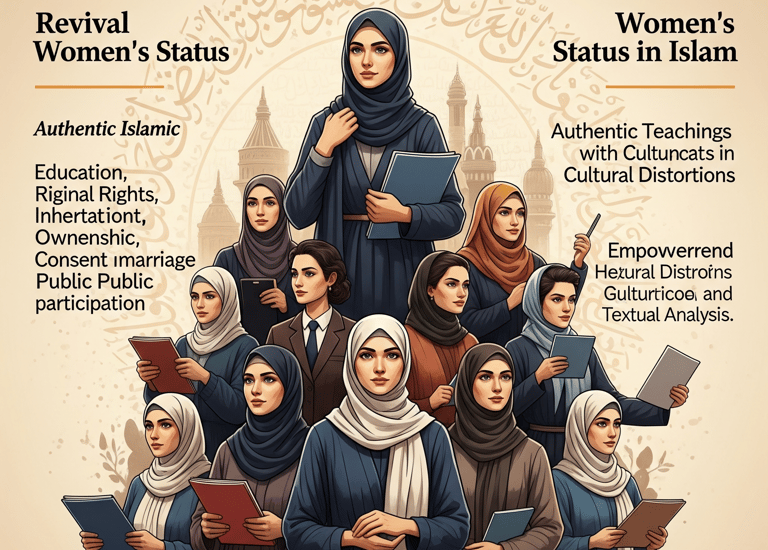

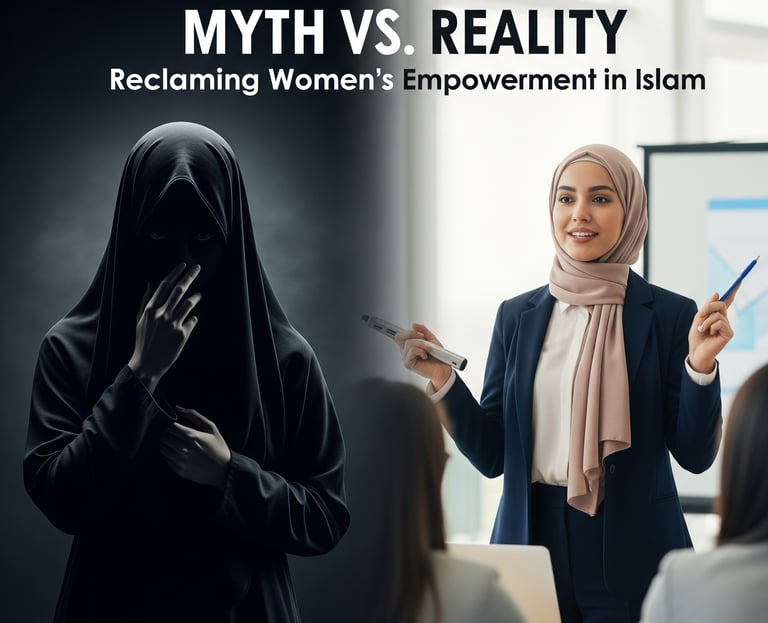

MYTH VS. REALITY:
RECLAIMING WOMEN’S EMPOWERMENT IN ISLAM
The discourse on women’s empowerment in Islam is often clouded by cultural practices, historical distortions, and media misrepresentations, leading to a significant gap between myth and reality. This paper seeks to explore the authentic Islamic perspective on women’s rights and status, as rooted in the Qur’an, Hadith, and the Prophet Muhammad’s (PBUH) practices. Contrary to widespread myths, Islam granted women remarkable rights in education, ownership, inheritance, marriage, and social participation long before many modern societies. By examining key Islamic texts and historical examples of empowered Muslim women, the paper challenges stereotypes and reclaims the narrative of female empowerment within an Islamic framework. It also differentiates between religious teachings and patriarchal cultural practices that often overshadow the original message of equality and dignity. This study aims to contribute to a more informed and balanced understanding of women’s empowerment in Islam.
Syeda Samia Wali, Dr Mufti Hammad Ullah Khan
Syeda Samia Wali, Dr Mufti Hammad Ullah Khan
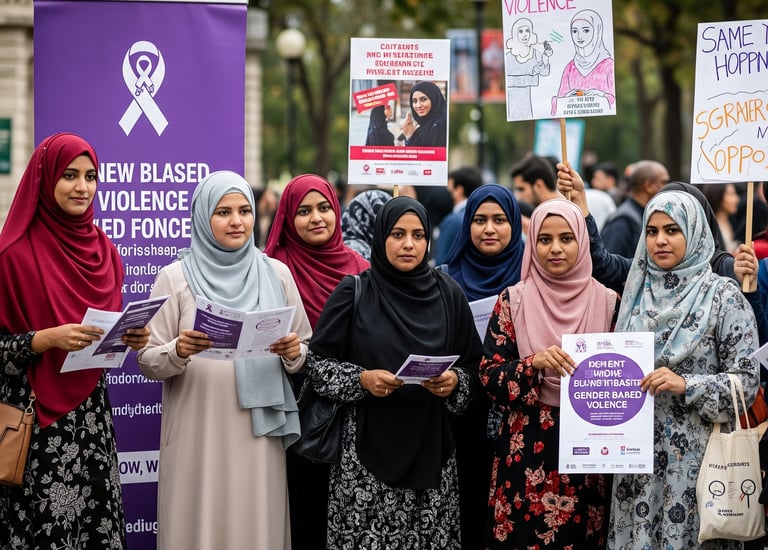

Gender-Based Violence and Islamic Responses:
A Study of Prevention and Protection Mechanisms for Muslim Women
This research article explores gender-based violence (GBV) from an Islamic perspective, focusing on the preventive and protective mechanisms available for Muslim women. While GBV is a global human rights concern, its impact on Muslim women often intersects with religious, cultural, and societal factors. This study critically examines the foundational Islamic teachings—drawn from the Qur’an, Hadith, and scholarly interpretations—that address justice, dignity, and the sanctity of life. It highlights how Islam not only condemns all forms of violence against women but also mandates societal responsibility for their protection. The research incorporates a comparative analysis of how Islamic responses to GBV are applied in different Muslim societies, with particular attention to legal reforms, community-based initiatives, and support services. The study emphasizes the need to revive authentic Islamic principles as tools for empowering women and combating GBV. Recommendations are offered for policy, education, and advocacy rooted in Islamic ethics.
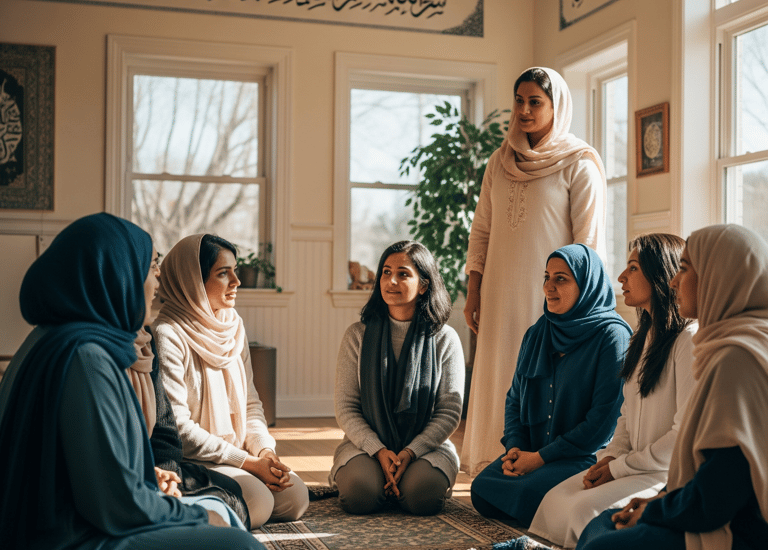

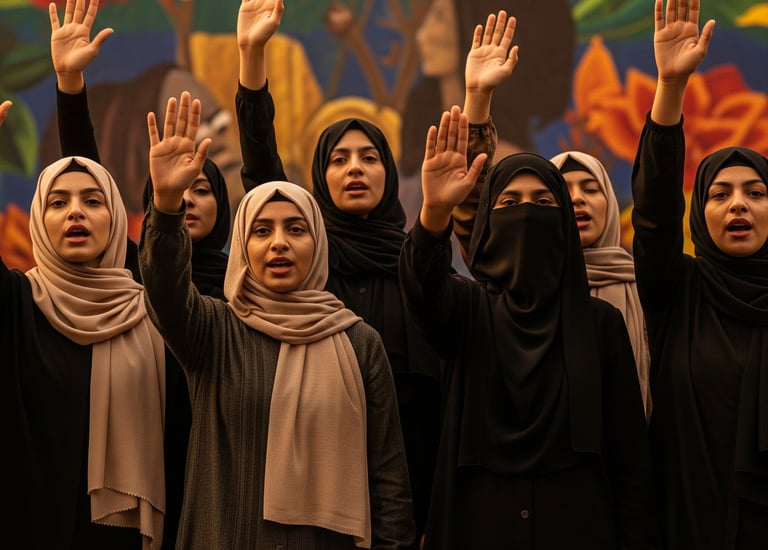



Muslim Women's Mental Health and Religious Identity:
Challenges and Coping Strategies in Diaspora Contexts
This study explores the mental health challenges and coping strategies of Muslim women living in diaspora contexts, focusing on the intersection between religious identity and psychosocial well-being. Through qualitative analysis of interviews and secondary data, the research highlights how Islam serves both as a source of resilience and a site of tension in secular societies. Factors such as Islamophobia, cultural alienation, identity conflict, and marginalization affect mental health outcomes, often compounded by stigma surrounding mental illness within Muslim communities. At the same time, religious practices, community networks, and spiritual coping mechanisms are shown to enhance emotional strength and psychological balance. Drawing on both psychological theories and Islamic perspectives, the research provides a nuanced understanding of how Muslim women negotiate their religious identity while confronting mental health challenges in diaspora. It recommends culturally competent mental health services, inclusive community programs, and faith-sensitive therapeutic approaches to address this complex issue.
Syeda Samia Wali
Syeda Samia Wali
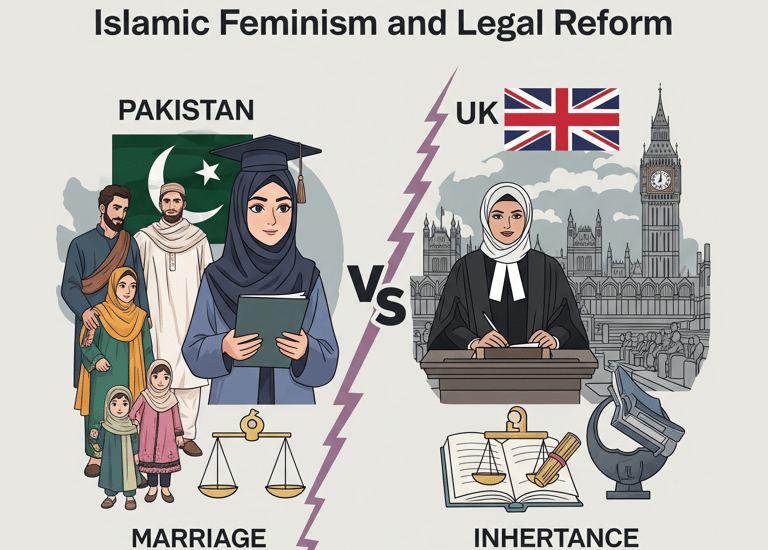

Islamic Feminism and Legal Reform:
A Comparative Study of Family Laws in Pakistan and the UK
This study explores the dynamic interplay between Islamic feminism and legal reform through a comparative lens focused on family laws in Pakistan and the United Kingdom. It examines how Islamic feminist interpretations challenge patriarchal readings of Islamic texts and promote gender-just legal frameworks. In Pakistan, religiously informed family laws are often restrictive for women, while in the UK, Muslim women navigate secular legal systems alongside religious tribunals such as Sharia councils. By comparing these two contexts, the study evaluates how Islamic feminist discourse informs legal agency and reform efforts. The research employs qualitative methods, including interviews and legal text analysis, to explore how Muslim women and scholars advocate for gender justice within Islamic paradigms. Findings highlight the tension between tradition and modernity, cultural practices, and women's rights. The study aims to contribute to the evolving discourse on Islamic feminism and encourage nuanced reforms that are both religiously rooted and gender-equitable.
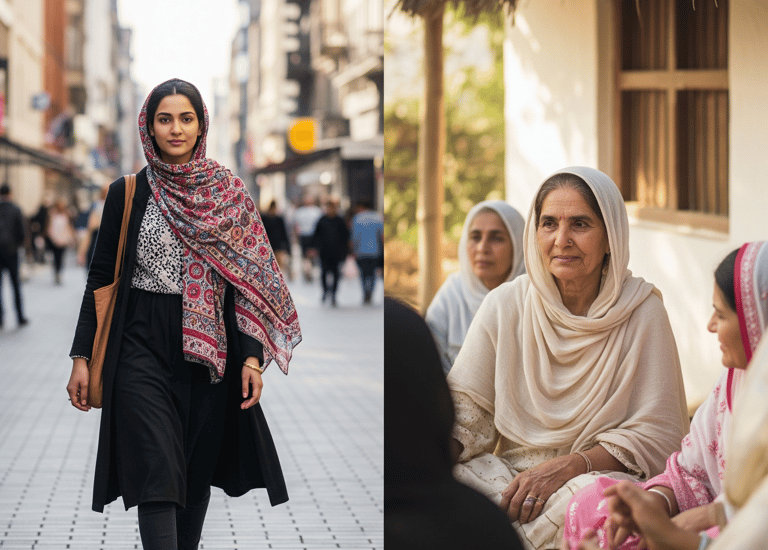

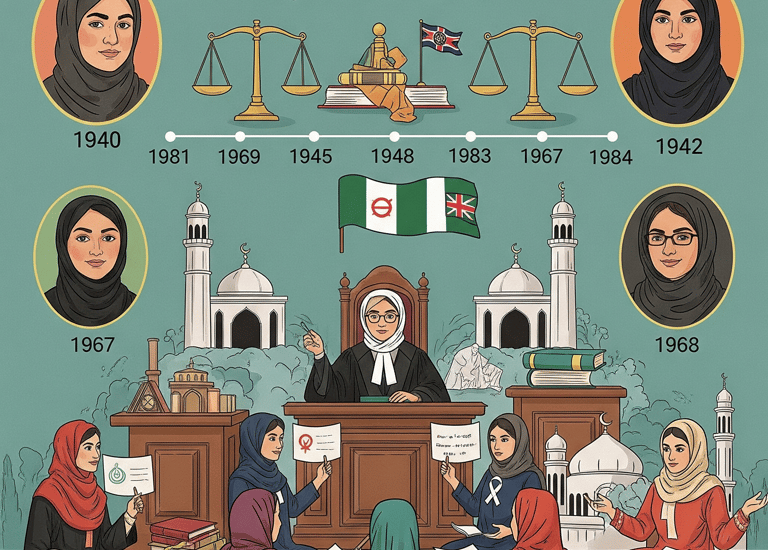

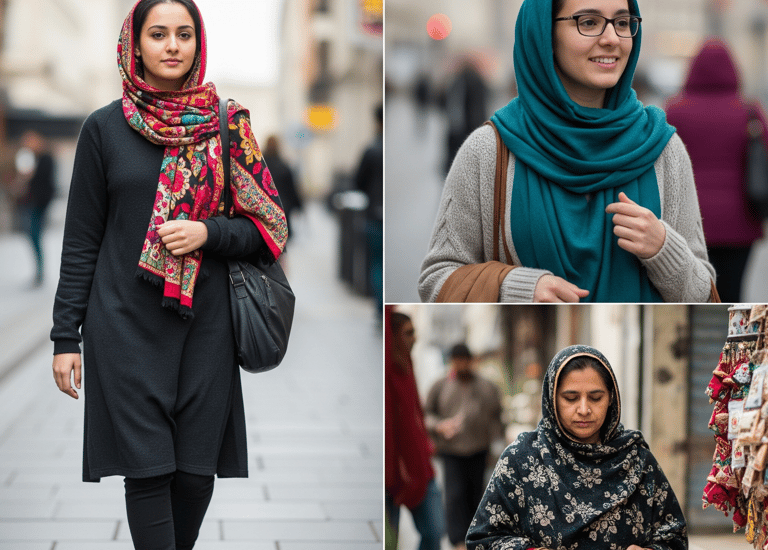

Hijab and Identity:
Comparative Narratives of Muslim Women in Western and South Asian Societies
This study explores the hijab as a symbol of identity, faith, and resistance in the lives of Muslim women from Western and South Asian societies. By analyzing qualitative narratives, the research highlights how Muslim women define, negotiate, and express their identities in diverse cultural, social, and political contexts. In the West, hijab often signifies resistance to Islamophobia and asserts religious identity amidst secular pressures. Conversely, in South Asia, the hijab may reflect traditional values, religious devotion, or socio-familial expectations. The study draws upon in-depth interviews and thematic analysis to uncover the nuanced motivations and meanings behind hijab practices. It challenges binary perspectives that view hijab as solely oppressive or empowering and instead situates it within women's lived realities. The findings emphasize the importance of context, voice, and agency in understanding Muslim women's experiences with the hijab and contribute to global gender and religious discourse.
Syeda Samia Wali
Syeda Samia Wali
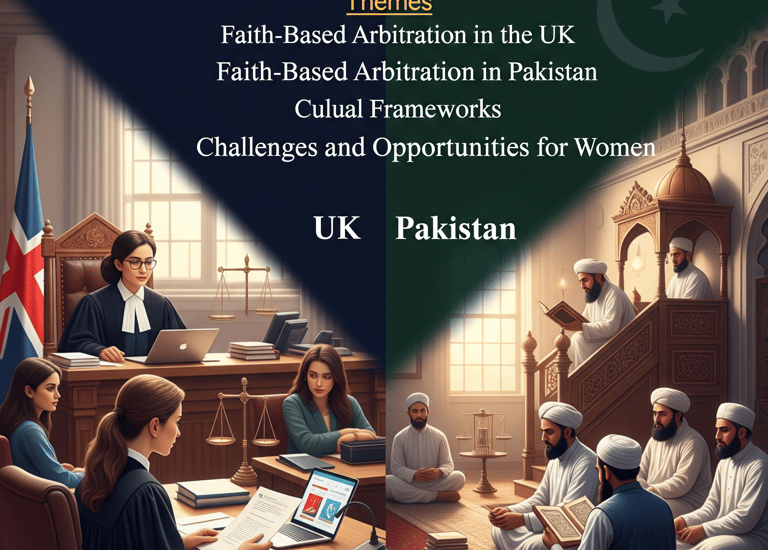

Sharia Councils and Women’s Rights:
Navigating Faith-Based Arbitration in the UK and Pakistan
Sharia Councils in the UK and Pakistan represent parallel yet contextually distinct models of faith-based arbitration. While in Pakistan, they function within an officially Islamic legal framework, in the UK they operate as informal tribunals within a secular legal system. This article critically examines how these councils impact Muslim women’s rights, particularly in areas such as marriage, divorce, and custody. Drawing on comparative qualitative data, legal texts, and interviews with scholars and practitioners, the research explores the intersections of religious authority, legal pluralism, and gender justice. It evaluates whether Sharia Councils empower or disempower women and to what extent they align with international human rights norms. The study highlights significant challenges—such as lack of state oversight in the UK and patriarchal legal interpretations in Pakistan—but also emerging reformist discourses that center women’s agency. Ultimately, this research contributes to broader debates on multiculturalism, religious freedom, and gender equality in Muslim contexts.
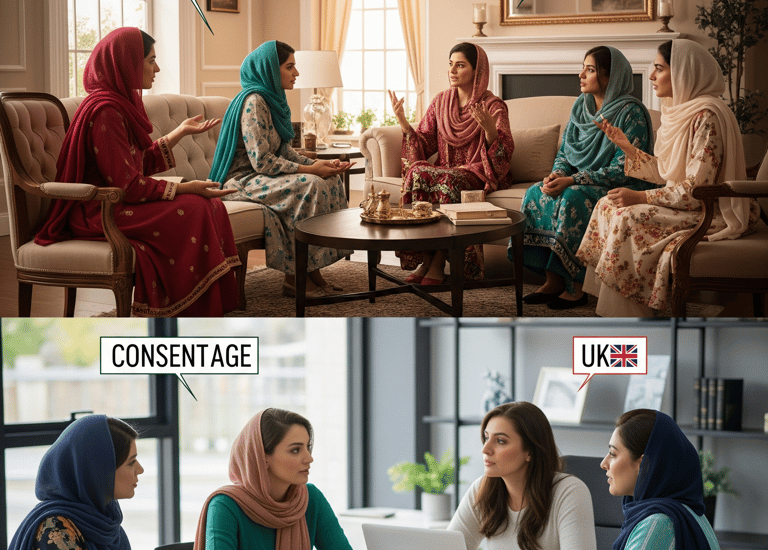

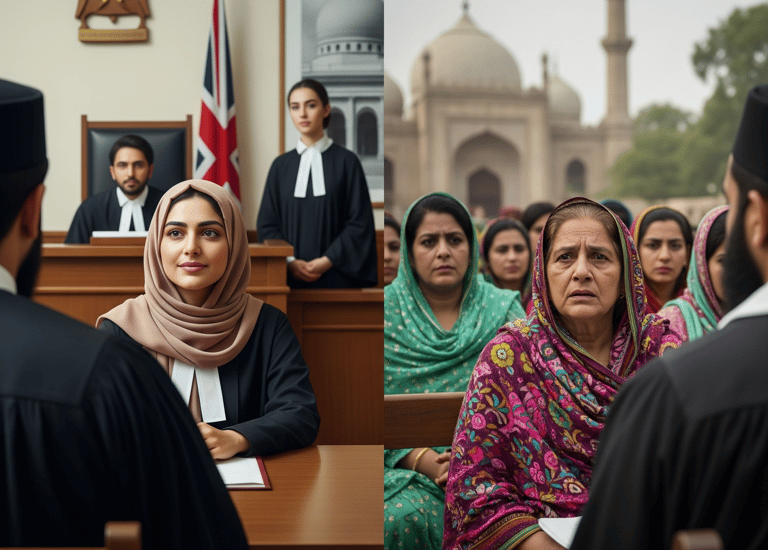

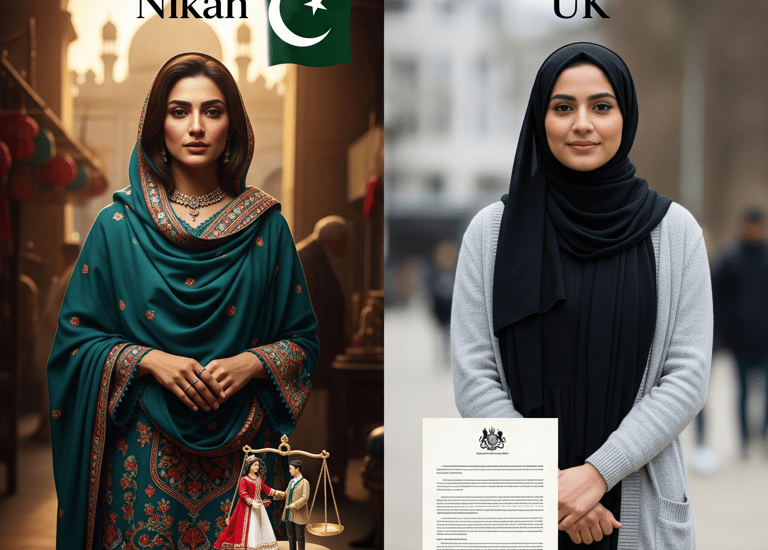

Marriage, Consent, and Autonomy:
Legal and Social Realities for Muslim Women in Pakistan and the UK
This article explores the interplay of marriage, consent, and autonomy within the legal and socio-cultural frameworks affecting Muslim women in Pakistan and the United Kingdom. While Islamic jurisprudence upholds consent as a fundamental component of marriage, cultural practices and legal interpretations often obscure or override this principle. In Pakistan, patriarchal norms and societal expectations frequently undermine women's agency, whereas in the UK, Muslim women encounter the dual challenge of navigating both secular legal systems and faith-based arbitration forums such as Sharia councils. Drawing on comparative legal analysis and qualitative data, the study examines how Muslim women assert their rights within these systems and the extent to which their autonomy is recognized or restricted. The research highlights structural and interpretive barriers, suggesting reforms rooted in both Islamic principles and human rights frameworks. Ultimately, the article seeks to bridge religious authenticity with gender justice in both Muslim-majority and minority contexts.
Syeda Samia Wali
Syeda Samia Wali


Islamic Teachings vs. Cultural Practices:
Reconstructing the Role of Women in Muslim Societies
This study explores the dichotomy between Islamic teachings and cultural practices concerning the role of women in Muslim societies. While Islam offers a framework of dignity, equality, and empowerment for women, cultural customs often distort or overshadow these principles, leading to socio-legal and psychological challenges. The paper critically examines how patriarchal traditions, often mistaken for religious mandates, influence gender roles and women’s rights in various Muslim communities. By analyzing scriptural sources alongside cultural patterns in different contexts, the research seeks to distinguish between authentic Islamic principles and localized practices that contribute to women’s marginalization. The study employs a comparative approach, drawing insights from Muslim-majority and minority societies, and utilizes qualitative data collected through interviews and content analysis. Findings indicate a significant gap between religious ideals and cultural realities, highlighting the need for reconstructing women's roles based on authentic Islamic values rather than inherited traditions. The research aims to foster awareness, reform, and policy change.
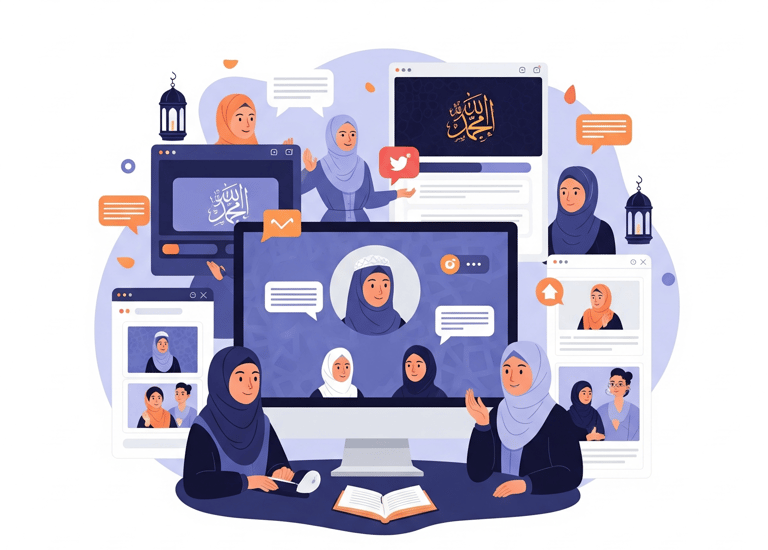

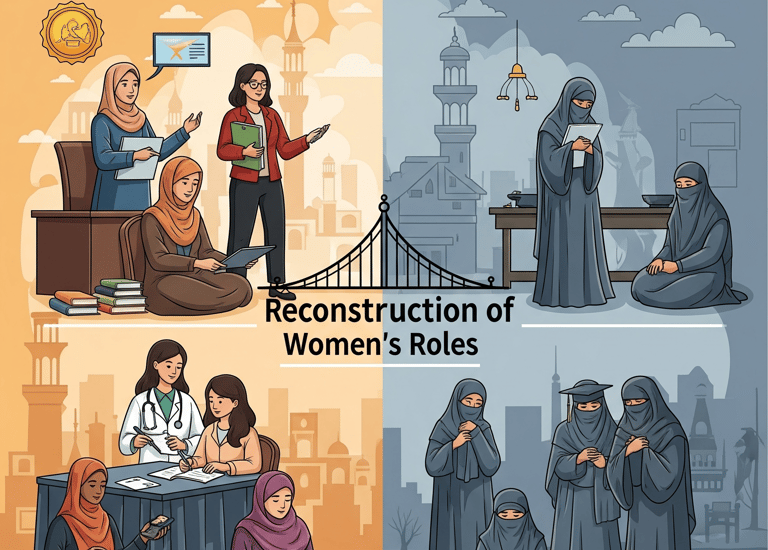

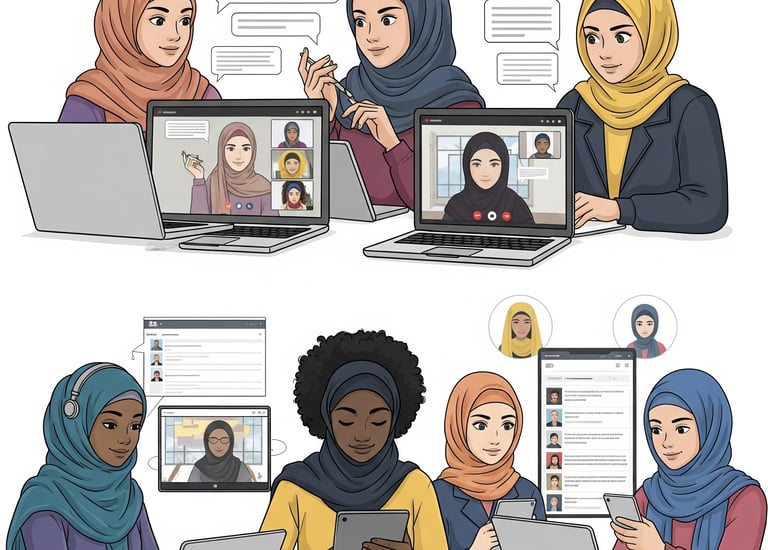

Digital Media and Muslim Women:
Reclaiming Empowerment through Online Islamic Discourse
In the digital age, Muslim women have increasingly turned to online platforms to engage with Islamic knowledge, challenge patriarchal interpretations, and reclaim religious narratives. This article explores how digital media is facilitating empowerment for Muslim women by providing accessible avenues for learning, expression, and community building. Through the analysis of social media, YouTube channels, blogs, and online forums, the study examines how Muslim women are reshaping traditional discourses on gender and Islam. The research adopts a qualitative methodology, using content analysis and semi-structured interviews with Muslim female influencers and scholars from diverse cultural backgrounds. Findings reveal that digital platforms serve as transformative spaces where religious identity and feminist consciousness intersect. The article highlights both the potentials and limitations of online Islamic discourse in resisting hegemonic interpretations and promoting agency among Muslim women. It contributes to scholarly debates on gender, religion, and technology by foregrounding the voices of Muslim women in digital religious spaces.
Syeda Samia Wali
Syeda Samia Wali
Contact Us for Research Queries
Reach out for inquiries about uploading articles, theses, or projects. We are here to assist you with your research publication needs.
Connect
+971-0503085731
Support
scholar@syedasamiawali.org
Subscribe for Research Updates
Stay informed about new publications and projects.
